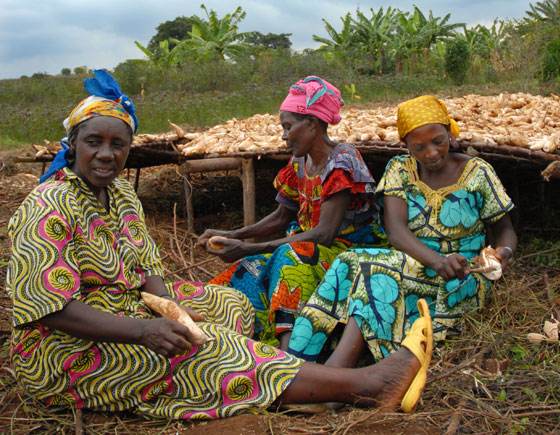 Our mobile clinic and research began in Ikoma, a village about 25km from Bukavu, the Capital City of the DRC’s South Kivu province. We made the trip in two hours and it was my first time driving on rural roads — lots of dust, rocks, and questionable bridges, but I now have some idea of why folks like to go off road in their 4x4s. It’s fun but exhausting.
Our mobile clinic and research began in Ikoma, a village about 25km from Bukavu, the Capital City of the DRC’s South Kivu province. We made the trip in two hours and it was my first time driving on rural roads — lots of dust, rocks, and questionable bridges, but I now have some idea of why folks like to go off road in their 4x4s. It’s fun but exhausting.
When we arrived in Ikoma we were greeted by the nursing staff at the health center and the villagers. Within a few minutes, Veneranda, a community health worker who is fabulous and has worked with the team over the past 2 years, arrived. It was great to see her. After a few minutes of introductions, one of the doctors on the team and a nurse from the village started an education session to villagers, primarily women, about sexually transmitted diseases and HIV/AIDS. The doctor spoke in Swahili, and the nurse than translated to Mashi, the local language.
After the session, we started to provide care to women, primarily women who survived captivity, rape, and torture. As the clinical care begins, the research assistants find quiet places away from the crowds to complete interviews with both female and male survivors of rape. The interviews focus on challenges to reintegration to family and community, with concerns about stigma, poverty, trauma, HIV/AIDS frequently raised.
We also interviewed the head nurse at the Health center and learned that since 2007, he has treated 40 male survivors of rape from the surrounding population of 37,000. Most of the men, as with female survivors, only seek care when they have become very ill because of fear of stigma and lack of financial resources.
We were also fortunate to interview a local priest in the Catholic Church who works with couples and families for reintegration. He noted several challenges — a lack of training in couples mediation for service providers and also a lack of services for children who have witnesses rape and violence against their family members and community.
Once the clinic and interviews were completed, we danced and sang with members of the community, then we all piled into the truck for the dusty ride to Bukavu with plans to return to the area on Thursday. Ideally, we could just stay in the village but it is not safe as there are still attacks by rebels and the military at night in the area.
The next day — June 30 — is DRC independence day … 50 years of independence from Belgium. It was quite the day, with parades, speeches, and fireworks over Lake Kivu — fabulous.
